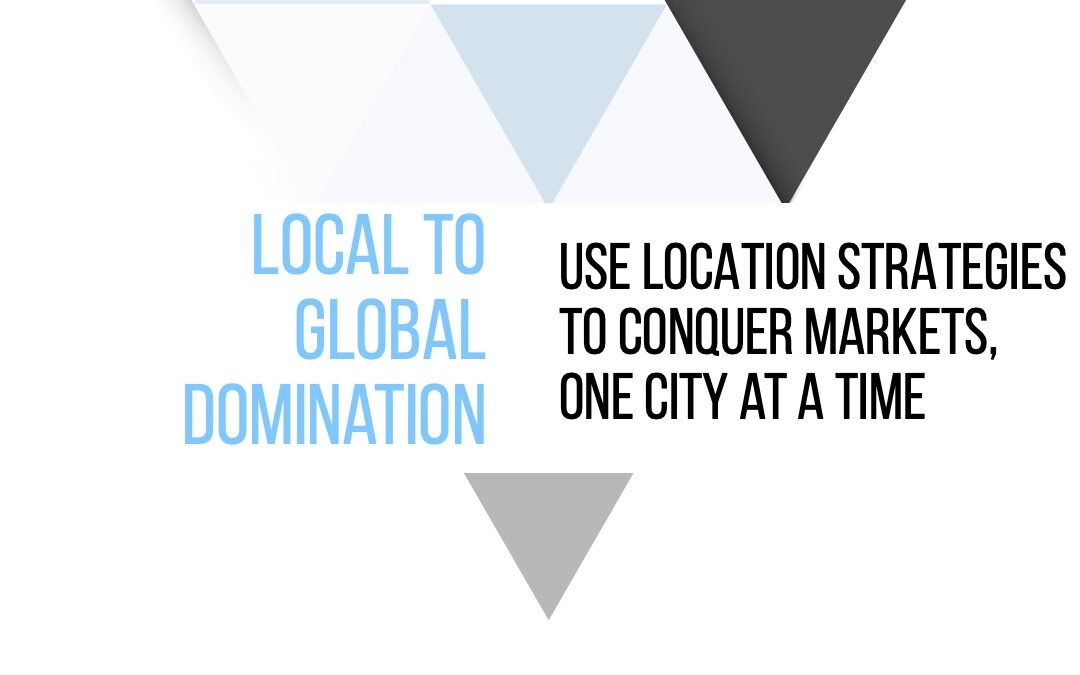Think Global, Act Local: Location Strategies to Win Markets Around the World
Introduction
Globalization is the new normal. Companies are increasingly tasked with competing in markets around the world and looking to expand their business operations into new locations. The good news is that there are still plenty of opportunities for growth, even if they aren't as plentiful as they used to be. That said, global expansion has never been more challenging than it is today—and that's because localizing your brand and products for international markets has become increasingly important (if not essential) for success.
The global world is the new normal.
The global world is the new normal. It's where we live, work and play, so it makes sense to think about your business in a global context all the time--not just when you're planning an overseas expansion.
Globalization has been happening for decades now, but it's still going strong. In fact, thanks to technology and other factors that are making us more connected than ever before (think: smartphones), globalization is accelerating even as overall growth slows down in many parts of the world. And since localization strategies have always been important for businesses looking to compete globally or tap into new markets overseas--not just when they first enter those markets--the importance of this approach will only increase as time goes on.
Put simply, localization is the process of making your product or service more appealing to a foreign market. It's not just about translating your website into another language and using different currency symbols; it's about understanding how people think and behave differently in other countries and cultures so that you can tailor your offering accordingly.
Top markets are still growing, but slowing.
Global markets are still growing, but at a slower rate than in the past. The world is becoming more competitive and saturated; it's also more complex and digital, with regulations that can make or break your business model.
In order to survive and thrive in this new environment, you'll need to think about location strategies that go beyond traditional geographies like "neighborhoods" or "countries."
Instead, you'll want to focus on the customer experience that your brand delivers wherever they are. This is why we've seen so many brands expand their reach with digital-first strategies like creating and sharing content, partnering with influencers on social media, launching new products in global markets at the same time.
Localization will be more important than ever.
Localization will be more important than ever.
Localization is about more than just language. It's about understanding the local market, culture and economy as well as regulatory environment. And if you don't understand these things, it's likely that your competitors will do so first--and they may end up beating you to market with a better product or service because of their knowledge.
Localization is not a one-time process. It's an ongoing commitment to understanding the local market, culture and economy as well as regulatory environment.
Geolocation intelligence is the key to success.
Geolocation intelligence is the ability to understand and analyze location data. It can help you understand your customers, competitors, and market--and make better decisions about where to expand or open new offices.
The difference between a good geolocation strategy and a great one is the ability to use data effectively in order to gain insight into your business operations. A good geolocation strategy will help you see which markets are performing well or poorly for your company; it may also give insight into how customer behavior varies across cities or regions within countries (for example: what products do people buy online in different parts of Europe?).
A great geolocation strategy will take things one step further by providing actionable recommendations based on this analysis so that companies can act accordingly if they want their businesses' success stories told through global expansion plans!
5 ways to leverage geolocation intelligence for your business.
- Use location intelligence to identify new markets.
- Optimize local marketing.
- Improve customer service.
- Personalize offers and experiences.
- Optimize supply chain operations.
Enhance customer experience. Improve operational efficiency and profitability. Reduce costs by reducing waste and inefficiencies.
Improve customer satisfaction and loyalty. Increase sales and revenue. Reduce costs by reducing waste and inefficiencies. Improve operational efficiency and profitability. Enhance customer experience.
Increase sales and revenue. Improve operational efficiency and profitability. Reduce costs by reducing waste and inefficiencies. Improve customer satisfaction and loyalty. Optimize local marketing. Personalize offers and experiences. Improve customer service. Enhance customer experience.
Improve operational efficiency and profitability. Enhance customer experience. Increase sales and revenue. Improve operational efficiency and profitability. Reduce costs by reducing waste and inefficiencies. Improve customer satisfaction and loyalty. Personalize offers and experiences. Optimize local marketing. Improve customer service. Enhance customer experience
. Improve operational efficiency and profitability. Reduce costs by reducing waste and inefficiencies. Improve customer satisfaction and loyalty. Increase sales and revenue. Reduce costs by reducing waste and inefficiencies. Improve operational efficiency and profitability. Enhance customer experience. Optimize local marketing
Global expansion is now a necessity for every company, but without location intelligence, it's too easy to miss out on opportunities or make mistakes that damage your brand and bottom line
Global expansion is now a necessity for every company, but without location intelligence, it's too easy to miss out on opportunities or make mistakes that damage your brand and bottom line.
In order to succeed in today's global marketplace, you need to be able to:
- Identify the best locations for new stores or offices based on factors such as market size and competition
- Understand how location influences customer behavior so you can tailor campaigns accordingly (e.g., localized content)
- Use data from your physical stores/offices so that you can optimize operations across all channels
Measure the effectiveness of your location-based marketing campaigns, so that you can make better decisions about where to allocate your resources for the future.
Geo-location data is a fundamental component of location intelligence. It’s the starting point for every analysis in our platform, and it enables us to create visualizations that present your data in a way that makes sense for you and your business. For example, if you want to see where customers are spending their money at different times of day or week, our dashboard will show you a heatmap so you can spot patterns easily.
Conclusion
The global world is the new normal. It has always been a challenge for companies to expand their reach globally, but it's now more important than ever before. With so many markets around the world growing at different rates, localization will be key in helping your brand succeed in new territories and grow its customer base. Geolocation intelligence offers companies a way to unlock the potential of their existing location data while also providing insights into how best to position themselves within each market they enter into.
From local to global domination: Location strategies help us conquer markets, one city at a time.




